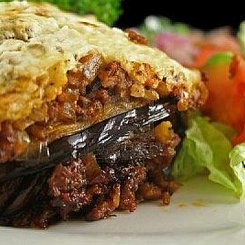Browse
- Appetizers (12)
- Beef (7)
- Beverages (14)
- Breads (32)
- Desserts (60)
- Dips (7)
- Dressings (9)
- Eggs (9)
- Fish (6)
- Grains (4)
- Holidays (4)
- Pasta (10)
- Pickles (3)
- Pork (10)
- Poultry (15)
- Rice (11)
- Salads (20)
- Sauces (17)
- Seasonings (2)
- Side Dishes (23)
- Snaks (9)
- Soups (35)
- Spreads (3)
- Traditional Recipes (57)
- Vegetables (24)
Recipe of the Day
Moussaka with Eggplant / Musaca cu patlagele vinete
In a saucepan containing 6 tablespoonfuls of butter, drippings or olive oil, fry 3 finely chopped onions to a nice light brown. Add 2 pounds of ground meat (mixed pork and veal) and cook until brown, stirring constandy t....





























